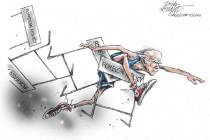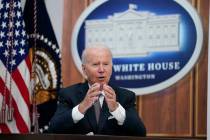Scrutinize open records exemption
The list of bill draft requests released by Nevada's Legislative Counsel Bureau this far ahead of next spring's legislative session is traditionally quite sketchy. The bills to be considered by the 2009 Legislature are still being drafted, after all.
But the one-line summaries can give an indication of which proposals may be worth keeping an eye on.
The Supreme Court is offered the chance to submit three bills for consideration by the Legislature each session, and this year's set falls easily into that "watch" list.
The brief summary of Bill Draft 408 reads "Exempts Judiciary from public records requirements applicable to other branches of government."
Number 409? "Expands sentencing discretion in specialty courts, also in sealing records."
And there's even less information available on BDR 410, identified simply as the "2009 Judicial Security Act."
Court spokesman Bill Gang said Thursday the court traditionally does not discuss or provide any further details on requested bills at this early stage.
Once the court does start talking, it's easy enough to predict we'll hear smooth assurances that bill drafts 408 and 409 are merely "minor bookkeeping" or "housekeeping" changes, designed to give court staff a bit more time and leeway to review documents and excise private identification information -- Social Security numbers, that kind of thing -- before making these records of the public's business, public.
Maybe. But that's how it always starts. Anyone who's ever dealt with the military, for instance, knows that junior officers can get in a lot more trouble for releasing information that was meant to be kept secret than they can for slapping a "Top Secret" stamp on something which no one can articulate any good reason to keep under wraps, with the end result that yesterday's cafeteria lunch menu is about as likely to be red-stamped and filed in a locked cabinet as it is to be thrown in the trash.
And bureaucratic default settings tend to mimic one another, across a wide range of organizations.
The justices are free to make their case for whatever changes they seek, in open public hearings before the Legislature. Nor is there any need to doubt the justices' sincerity, if they protest: "There's no intention here to close legitimate public records from public view, on any broad basis."
Because the question is not merely the intent, but the likely result over time, if the courts shift from openness as the default setting to an assertion that you can "trust the clerks" after they're given unlimited time to hover over those public documents with their black marking pens and their "sealed" stamps.
The judiciary branch has a whole lot of 'splaining to do before the courts should be granted any exemption "from public records requirements applicable to other branches of government," as bill draft 408 proposes.
And if there's been a problem revealed in "discretion with sealing records" on the part of Nevada's judges in recent years, the problem has been that they seem to seal anything they please, on little more than a personal whim, and then neglect to tell anyone about it -- not that their discretion needs "expanding."
As for the "Judicial Security Act" -- who knows?
Yes, it's early to know precisely what the judges have in mind. But any broad new discretion in the sealing of records, or substantial exemption of the judiciary from open public records requirements, would be serious steps in the wrong direction.
The lawmakers -- and the public -- need to watch these closely.

















